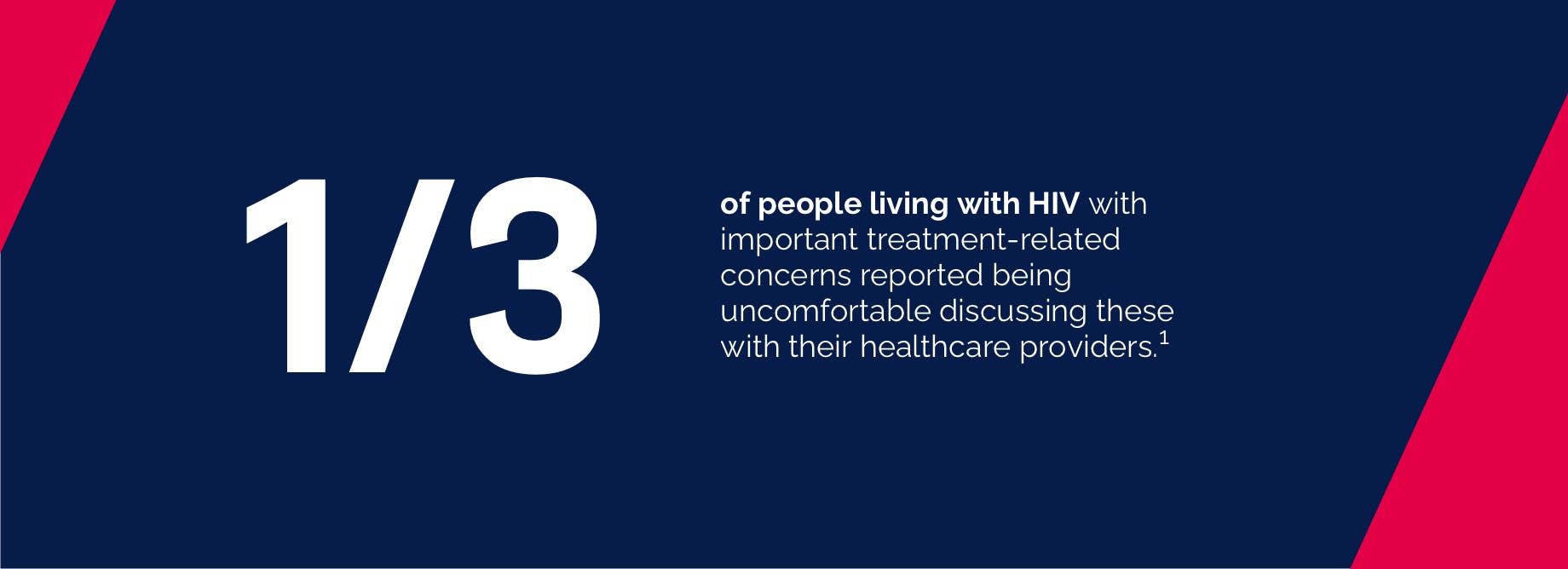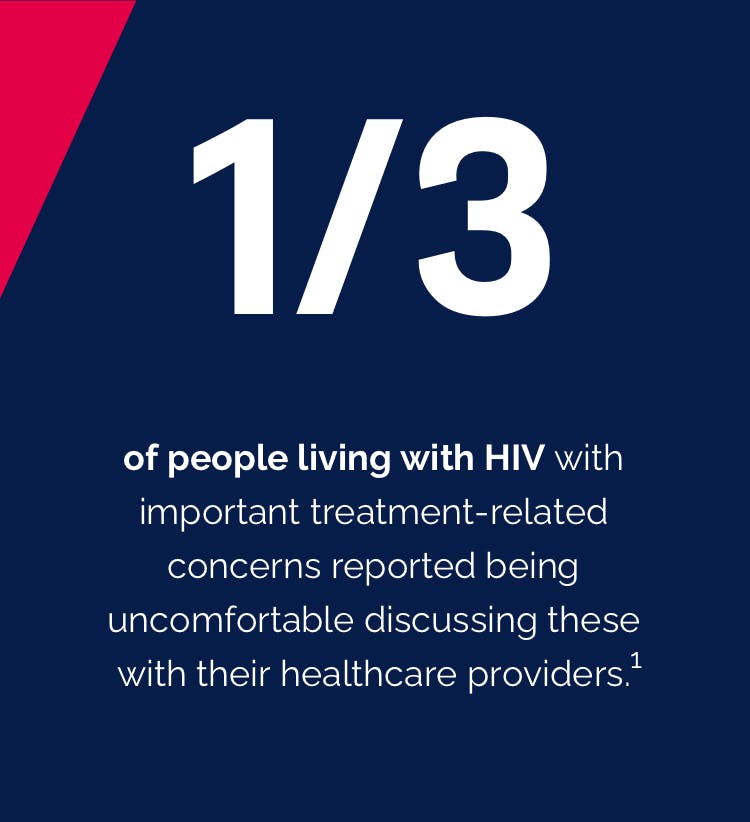GOOD COMMUNICATION BETWEEN PEOPLE LIVING WITH HIV AND HCPS

Global Positive Perspectives data demonstrate a strong link between high reported engagement with healthcare providers (HCPs) and positive self-reported health outcomes for people living with HIV (PLHIV), yet study results also show many do not feel comfortable raising important treatment issues.1
When considering how to make the most of often time-limited and sometimes virtual HIV consultations, two-way communication between people living with HIV and their healthcare providers may encourage joint decision making and support improved quality of life and health outcomes. According to published Positive Perspectives data, reported high-quality communication with HCPs was associated with people living with HIV reporting treatment satisfaction, enough understanding of their treatment, and perceiving their treatment needs as met.1
But the data indicated that a substantial proportion of people living with HIV did not report experiencing high engagement with their healthcare providers, and this was associated with significantly poorer self-reported health outcomes. Among Positive Perspectives participants, the most commonly reported barriers to communication with HCPs were:1
- Fear of being labelled a ‘difficult patient’ (27%, 638/2,389)
- Perception that the HCP knows best (23%, 540/2,389)
- Despair that nothing much could be done to help (21%, 508/2,389)


One third of people living with HIV with important treatment-related concerns reported being uncomfortable discussing these with their healthcare providers.1
Those PLHIV in the study who reported only low or moderate engagement with their HCPs were more likely to report treatment dissatisfaction and suboptimal overall health than those reporting high engagement with their HCPs.1
“Because so many issues can affect clinical outcomes for those of us living with HIV, good quality communication looking at holistic markers of treatment success is essential. When we are seen as partners in care, we can work together on improving quality of life beyond viral suppression. Now we’re experiencing less personal, virtual HIV consultations, so I hope these Positive Perspectives study results published in AIDS and Behaviour encourage people living with HIV and their healthcare providers to prepare for open dialogue during appointments.”
While virtual consultations can provide people living with HIV the opportunity to receive continuous, personal care through reducing compounding factors such as distance to clinics1, these Positive Perspectives study results emphasise the importance of people living with HIV feeling empowered to initiate open dialogue during these appointments. The data demonstrate the importance of HCPs providing environments where the people living with HIV they look after are empowered to discuss their health care and treatment holistically.
For more information, ViiV Healthcare supports the Positively Thriving podcast series, including an episode focusing on virtual HIV consultations with tips for people living with HIV and their healthcare providers to get the most out of appointments.

The Positive Perspectives study is one of the largest, global, HIV patient-reported outcomes (PROs) studies to date, with 2,389 people living with HIV participating from 25 countries. Participants were asked to rate their own health, how living with HIV impacts their lives and affects their outlook for the future, as well as examining their interactions and relationships with HCPs and their experiences with ART. All findings are self-reported.
Reference:
- Okoli C, Brough G, Allan B, Castellanos E, Young B, Eremin A, Corbelli G M, McBritton M, Muchenje M, Van de Velde N, de los Rios P; Shared Decision Making Between Patients and Healthcare Providers and its Association with Favorable Health Outcomes Among People Living with HIV; AIDS and Behaviour https://doi.org/10.1007/s10461-020-02973-4
YOU MAY ALSO BE INTERESTED IN:
The Global Positive Perspectives Wave 2 Study is one of the largest, global, HIV patient-reported outcomes studies to date, involving 2,389 people living with HIV (PLHIV) aged 18-84 across 25 countries.
The latest Positive Perspectives (Wave 2) is one of the largest, global, HIV patient-reported outcomes (PROs) studies to date and provides perspectives from a diverse group of people living with HIV across the world.
Find out more about how taking multiple medications can affect quality of life for people living with HIV. Data from Positive Perspectives study (Wave 2).
If you get any side effects, talk to your doctor, pharmacist, or nurse. This includes any possible side effects not listed in the package leaflet. You can also report side effects directly via the GSK Reporting Tool link https://gsk.public.reportum.com/. By reporting side effects, you can help provide more information on the safety of this medicine.
If you are from outside the UK, you can report adverse events to GSK/ ViiV by selecting your region and market, here.




